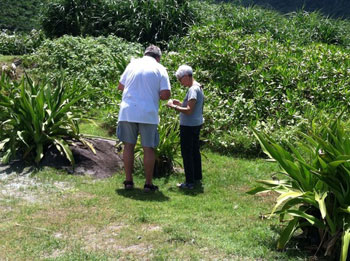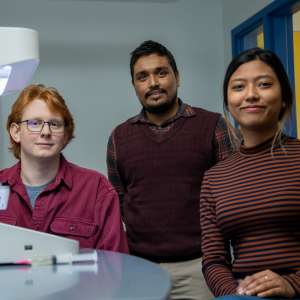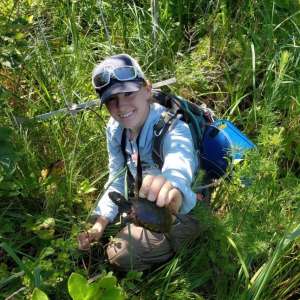Biology Professor Brings Spider Research to Taiwan

Biology professor, Dr. Karen Cangialosi, has been invading the web of arachnology in a very similar fashion to the species of spiders she and her colleagues have been studying.
Along with Dr. Scott Strong and recent graduate Tim Hastings, Dr. Cangialosi has been studying the behaviors of a species of spiders called Neospintharus trigonum. “It’s a species that’s been interesting to me because they have very flexible foraging strategies; they invade the web of spiders instead of building their own webs,” she says. “Now and again they’ll decide to eat the host spider instead of steal the food, so they kind of alternate between kleptoparasitism and host predation.”
The Neospintharus trigonum spiders are within a subfamily of spiders called Argyrodinite, which includes over 200 different species of spiders. Many of these spiders live in China, Taiwan, and Japan. The team has been exploring and using molecular techniques to examine the DNA of the content within the spider’s gut in order to determine whether or not it has preyed on the host spider of the web it invaded, or simply the insects. “What we want to be able to do is track the percentage of the population that’s feeding on either insects or spiders,” Dr. Cangialosi adds.
Although still in preliminary stages, Dr. Cangialosi presented their current findings at the 19th International Congress of Arachnology, in an oral presentation titled, “Using Molecular Gut Content Analyses to Examine Foraging Behavior in Neospintharus trigonum.” The congress meets triennially in different locations around the world, this year taking place at Howard Beach Resort in Kenting National Park, Taiwan, between July 23rd and July 28th. “It was great to talk to some of my colleagues that work with a similar group of spiders,” says Cangialosi.
Dr. Cangialosi adds that attending the conference helps enrich not only her studies, but her teachings as well, allowing her to stay up to date within the field of arachnology and allow for deeper conversations in her classrooms. “Just learning about what others are doing in arachnology helps me to fuel ideas about the kinds of things I might want to do next,” she says. “And when we come back to teach stuff, I can reference some of the studies that other scientists are doing that I learned about at the conference, and that may not be in a journal or a textbook yet.”
Dr. Cangialosi has been studying the behavior of the Neospintharus trigonum for over 20 years on various projects, many which have been published and presented. She plans to publish her next piece on the gut content research within the next few years.





